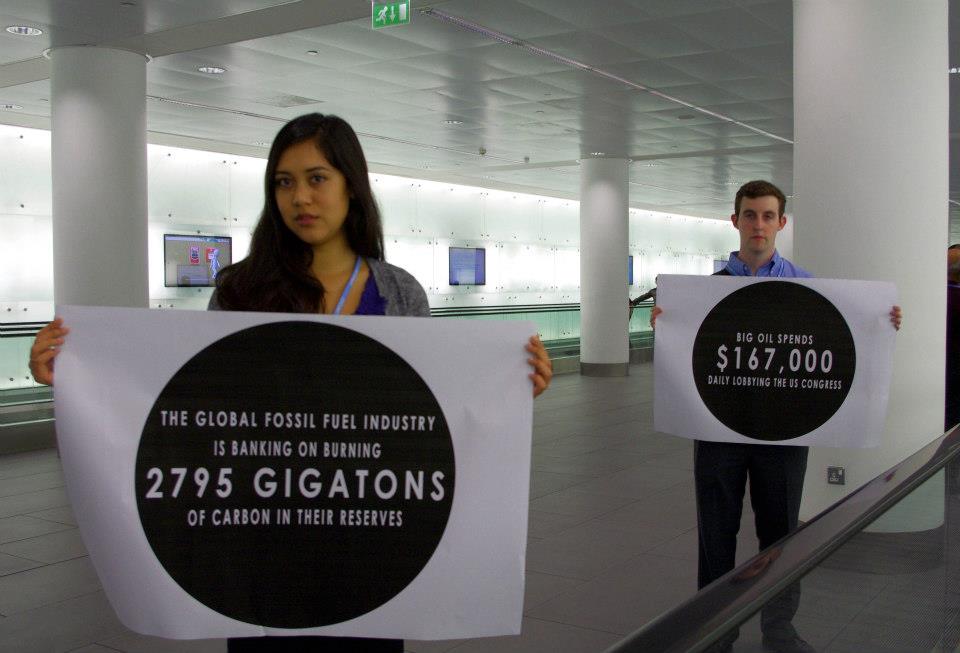Change the conversation, support rabble.ca today.
This is the time of year for businesspeople to determine the course of our future. Out come the expensive jackets, polished shoes and snazzy cars for Doha World Business Day organized by the World Business Council for Sustainable Development.
It is the day when profit-mongering corporations talk about their “commitment to low-carbon economic growth.” So as leaders from Shell and BMW sit around a table discussing their “green image,” visions of cancer plagued frontline communities are making our stomachs churn.
Youth from around the world staged a silent action today at COP 18, calling on political leaders and negotiators to stop being persuaded by fossil fuel industries. Young people held up signs with facts about the unsettling amount of corporate influence on international negotiating processes. Messages such as “Canadian tar sands companies have admitted to approving national negotiating positions behind closed doors” were blatantly displayed in the faces of delegates and negotiators as they walked through the entrance into their second week of COP 18.
During last year’s UNFCCC, Chief Allan Adam of ACFN (Athabasca Chipewyan First Nations, one of the communities living downstream from the tar sands) and allies rallied outside of the Shell Corporate Headquarters in downtown Calgary to present Shell with legal papers.
In September of 2011, the Athabasca Chipewyan First Nations filed a suit against Shell Oil Canada because Shell was not meeting contractual agreements made with the ACFN in 2003 and 2006. Shell has consistently failed to meet contractual agreements made with ACFN, such as the company’s statement to provide measures to lessen industrial impacts in the nation and address environmental issues.
Shell has been a driving force in producing Canada’s dirty climate legacy, the tar sands. Communities, such as Fort Chipewyan, no longer feel comfortable drinking their water. Increasingly, these people have seen their friends and family deteriorate due to an unearthly toll of cancer diagnoses.
The oil being extracted in Alberta is creating tailing ponds of toxic sludge, increasing the arsenic level in food, and releasing Benzene, one of the most lethal human carcinogens, into the atmosphere at a rate of 100 tonnes per year. The Alberta Cancer Board concluded the cancer rates were 30 per cent higher than expected in Fort Chipewyan.
These disconcerting figures will only get worse as forums such as COP 18 allow corporations such as Shell to perpetuate their agenda, which does not include placing a moratorium on tar sands exploration. The thickness of their wallets has cost the lives of many, and has stifled the voices of entire communities.
Today, the Canadian Youth Delegation has also launched a policy report titled, “Commitment Issues: Tar sands extraction invalidates Canada’s obligations to the UNFCCC and undermines global climate change negotiations,” which highlights Canada’s inaction in dealing with its international commitments and the role of the tar sands in ensuring this failure. In a press conference held at the negotiations, youth along with IEN (Indigenous Environmental Network) director Tom Goldtooth have also emphasized the necessity of ending tar sands expansion projects in order to pave the way for a fair, just, and ambitious negotiating process at the UNFCCC.
Until political leaders such as Canada’s Minister of the Environment take action in stopping fossil fuel industries from destroying the lives of people and the planet, corporate executives from Shell will continue to sit on their fancy chairs at world business forums and contaminate COP with environmentally destructive agendas paint-brushed under the name of “sustainability.”
Nadia Kanji and Peggy Lam are members of the Canadian Youth Delegation to COP 18 in Doha Qatar. For more information, visit http://cyd-djc.org.



